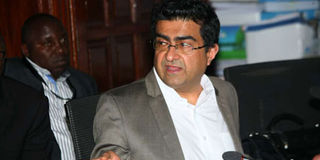Kenya government loses appeal in the Goldenberg Scandal

What you need to know:
Court of Appeal judges last week dismissed an appeal by the defunct Kenya Anti-Corruption Commission, saying an instruction fee of Sh10 million that it was ordered to pay two companies was correct.
Nairobi. Ghosts of the Goldenberg scandal continue to haunt the Kenyan government as the appellate court has dismissed a case filed by the anti-graft body, disputing costs it was slapped with more than a decade ago.
Court of Appeal judges last week dismissed an appeal by the defunct Kenya Anti-Corruption Commission, saying an instruction fee of Sh10 million that it was ordered to pay two companies was correct.
The two companies associated with businessman Kamlesh Pattni were to get Sh5 million each.
Receivership
KACC, the predecessor of the Ethics and Anti-Corruption Commission (EACC), had argued that the amount it was ordered to pay for seeking to place Marshalls East Africa Limited, Delphis Bank Limited and other companies associated with the Goldenberg architect, under receivership, was excessive.
While seeking to place the nine companies under a receiver manager, KACC said 95 percent of the shares in the companies were acquired by Mr Pattni through the proceeds of the Goldenberg scandal, in which the government lost Sh5.8 billion.
The anti-graft body also stated then that the attempt to transfer those shares to Ketan Somaia would be of no legal effect.
But before the case could be heard, the parties reached a settlement.
COSTS AWARD
Because they felt that they were wrongly sued in the first place, the two companies filed a bill of costs for Sh60,470,778 and Sh80,573,021, respectively.
After assessing the fees, the deputy registrar taxed the two bills at Sh5,266,320 and instruction fees at Sh5 million, for each one.
Dissatisfied with the award of Sh5 million as instructions fees, KACC filed a reference before the High Court for the award of instructions fees to be set aside and the bill to be remitted to another taxing officer for fresh taxation of that single item.
The commission argued that the award of costs was manifestly excessive and that the taxing officer made fundamental errors when he found the companies were associated with the rip-off through the Goldenberg scandal.
It noted that the companies were not accused of theft of any public funds, hence did not have to defend themselves.
THE RULING
After hearing the case, Justice Joseph Sergon dismissed the KACC's appeal, saying the deputy registrar did not err in arriving at the figure.
The commission filed a second appeal but Justices William Ouko, Asike Makhandia and Sankai ole Kantai agreed with High Court judge, stating that a suit meant to recover 95 percent of the shareholding of nearly nine companies was not a simple matter.
They said the case was illustrated by billions of shillings allegedly involved and the voluminous court records both before them and the High Court.
“As we respectfully agree with the Judge, we reiterate that there can be no doubt, from what we have said, that the dispute was not only complex but also novel,” the judges said.
They noted that Justice Sergon correctly observed that the appointment of a receiver manager over the companies was bound to paralyse and divest the powers of the directors of the two companies and vest them in the manager.
DUE DILIGENCE
The two companies accused KAAC of not conducting due diligence and by subsequently withdrawing the action, the commission’s initial action was actuated by malice.
But KACC defended itself, saying it was erroneous for the taxing officer to come to the conclusion that the matter was complex based merely on the volume of the record and without stating any specific issue that resulted in that conclusion.
It further argued that the judge erred in failing to find that the companies did not file any defence or response to the main suit.




